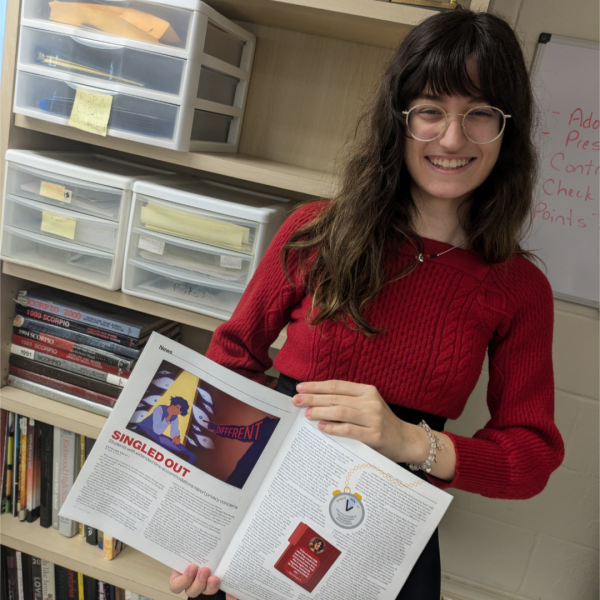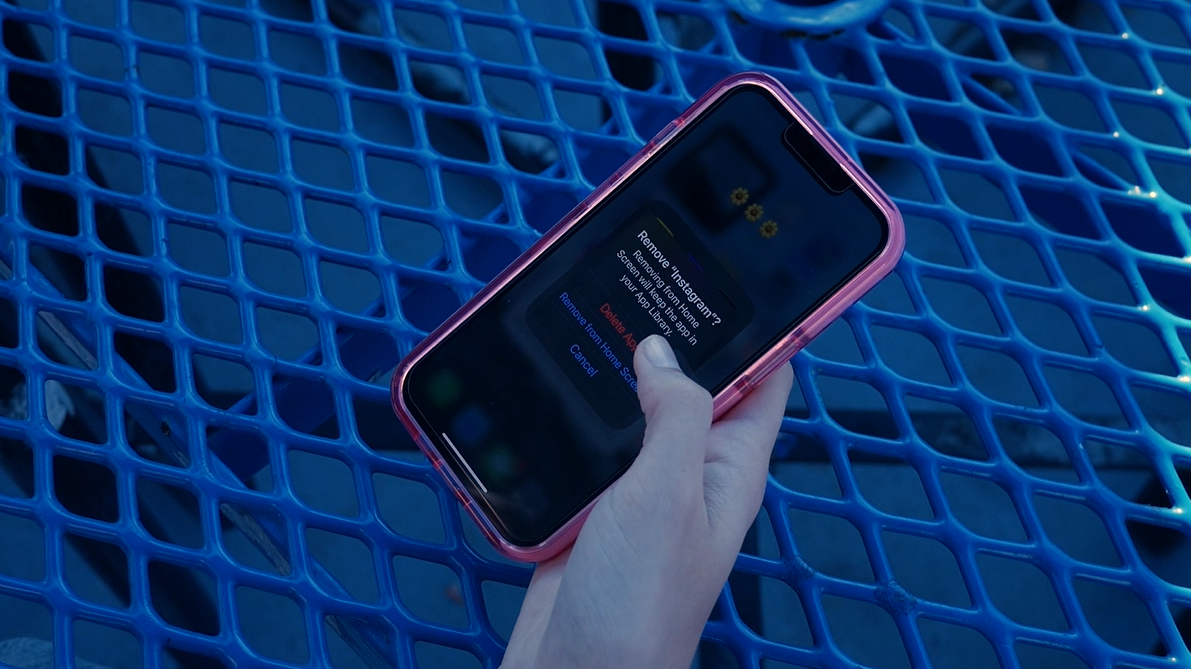When 2023 short film “Ninety-Five Senses” was nominated for this year’s Academy Awards, news of West Shore graduate Michael Grover’s work on the animation was quick to reach digital art teacher James Finch.
The short was written by Jerusha and Jared Hess of “Napoleon Dynamite” and “Nacho Libre,” and it follows the story of an older man who recounts his life experiences with the five senses while having little time left to enjoy them. Grover, who joined the project in 2019 through recommendation from a previous employer, was one of 11 animators who worked on each of the short’s five segments. He was the sole animator and lead of the “hearing” section.
“I could immediately tell [which part of the short was his],” Finch said. “His style wasn’t as edgy as he normally did, he smoothed it out a little bit, but it still had the same kind of compositional elements. He’s got his voice. It’s like when you hear someone singing and you go ‘oh, yeah, that’s Taylor Swift.’ It can be a different song, but it’s her voice.”
Currently working as a freelance artist, Grover graduated high school in 2009 and attended Brigham Young University in Provo, Utah. Now married, Grover has been living in Melbourne to allow his four children to grow up where he did.
“I have always felt compelled to create art,” Grover said. “I don’t really know why. It’s a deep-rooted impulse for me. There was never really a question in my mind about whether I wanted to pursue it as a career, my questions were more like ‘how do I make a living doing this? Am I good enough? I know I want to do it, but should I do it?’ I started wrestling with that during high school and especially during college, and I’m still figuring out the answers.”
Since he was young, Grover often drew comics, inspired by newspaper strips like “Peanuts” and “Calvin and Hobbes.” Growing up, he said he saw newspaper comic artists slowly go out of fashion, beginning to develop an interest in digital artwork as a more sustainable career. During his time in high school, Grover took Digital Arts 1 and 2 as well as AP Digital Art with Finch.
“Graphic design and art classes with Mr. Finch were awesome,” Grover said. “Mr. Finch’s computer lab and the band room were my two safe spaces at West Shore … Mr. Finch’s classes were super-helpful for giving me a foundation in general art theory. Taking his graphics classes made me much more comfortable with computers, and suddenly, working in animation seemed like an attainable goal.”
Grover has returned to campus in the past as a guest speaker for many of Finch’s classes, having visited in 2023. In the wake of his recent success, Grover once again spoke with students in Finch’s classes in late January. Finch described Grover as “very giving of his time” in regard to his eagerness to talk to art students.
“People mentioned there was someone from West Shore who worked on a short film that was nominated for an Oscar,” senior and AP Digital Art student Noah Holmquist said. “Seeing how he worked on such a big project gives all art students hope that it’s possible to strike big in the arts at West Shore. During his presentation, he showed us the part of the film he worked on as well as his other works and his website.”
Grover, in addition to being a freelance artist, is a webcomic artist in his spare time. Currently, he is working on his latest project, a comic called “Deeply Dave” that is set to be published in print next year by Macmillan Publishers.
“After seeing his presentation in class, I read the entirety of one of his comics, ‘Hamburglar Goes to Hell,’ on his website,” senior and AP Digital Art student Halle Konicki said. “When he came, he showed the part of the short film that he’d worked on, and I ended up watching the full thing on my own later. I thought his work on it was absolutely amazing and I really admire his style. It seems almost simple and cartoony but clearly has a lot of skill behind it.”
Grover said that throughout the development of the film, the two lead screenwriters gave the animators a lot of freedom in terms of visuals and style, with little besides the main character’s monologue to restrict their ideas.
“When I was at West Shore, I was used to being known as one of the two or three art kids in my grade,” he said. “It was a lot more competitive once I was at college trying to get into the animation program at BYU. I was rejected the first time and had to spend another year building up my application and practicing drawing fundamentals so I could apply again, so I would say West Shore was great preparation for that.”
Upon visiting the school, Grover said he was surprised at the increase of art students in Finch’s classes with a genuine interest in art as a career. He said that, so long as they do not take credit for others’ work, young artists should not be afraid to learn from each other and share their styles through communities like these classes.
“I think it’s so great that there’s a lot of kids interested in art at the school because it’s super helpful to have a sense of community,” Grover said. “You can be showing each other your work and get feedback on it. That’s probably one of the most valuable things I got from college, friendships with other artists that I still talk to years later, so it’s awesome that a community like that exists and is being developed at West Shore.”
During his time in high school, Grover created numerous comics and works of art for his classes with Finch, including his “Planet Michael” comics for his AP Digital Art concentration project and a five-minute-long animation for his Senior Project. Beyond his digital work with Finch, Grover also contributed comic strips to the “Roar” during his six years at the school, which at the time was a newspaper.
“I’m very, very proud of [Roar adviser Mark] Schledorn and Mr. Finch and their ability to motivate and inspire a student,” Principal Rick Fleming said. “Finch has an eye for talented kids, and he’s had so many successful students come through his program. Michael [said] that everything he learned here was basically his knowledge base. He learned more in college, but he said everything he’d learned here was the inspiration for him to do what he’s doing now. When he got to college, he already knew a lot of things about animation and some of the programs he used in class.”
When recalling the most important skills he obtained at West Shore for later on in his career, Grover said that “a big thing is finishing projects to build your portfolio.” He cited Finch’s continuous practice of having his students enroll in many art competitions as an example of a helpful deadline that can help build motivation to finish works — a practice which Finch continues to uphold.
“There is no school besides West Shore that goes to every single contest in the county,” Finch said. “We’re in the public and parents see that, but at the end of the day, it’s a lottery. I don’t get kids in here that want to go into art school when they come in here, I get kids that have parents that want them to be prepared for college. It’s hard to think about how we can see [Michael’s success] in the community or how it can bring art students into the school because it doesn’t. It doesn’t bring one art student into the school because it is literally a lottery.”
In contrast to Finch, Fleming said he is optimistic about the inspiration that Grover’s story could bring to the community on campus as a whole, as well as to potential students who might enroll in the future.
“I think Michael’s success in this venue will help others to see that West Shore’s not all about math, science, science research and all these things that we’re good at, but also that we have opportunities for enrichment in the arts,” Fleming said. “Parents that maybe have careers in the arts or in the fine and performing arts might want to apply for their kids to come here, or they might push their kids and say ‘I want you to have that teacher, he’s inspired so many people.’ I think it can help in terms of seeing us as more than just this academic institution that churns out lawyers, doctors, and engineers, but that we also have students who are gifted in the arts and go on to pursue that successfully.”
Despite his bleaker outlook on the school’s reputation as a school being seemingly fated to never have artistry as a central feature, Finch said that he still believes the school’s art department is incredibly strong, with Grover’s success being a testament to that.
“I call the art program one of our jewels in the crown that is West Shore,” Finch said. “We have many jewels. Science: we have students who win national awards. Math competitions: I’ve talked to teachers at other schools and they always say they’re tired of coming in third place after West Shore and Edgewood. Latin and all the foreign languages, too. We have all of these jewels in our crown, and the arts are just another jewel.”
Grover shared that, despite his passion for the arts, he sees the education that he got during his high school years as a good foundation for the later years of his life, so he wouldn’t necessarily want West Shore to become an art-centric school.
“It’s good to know literature if you’re gonna be making movies and comics,” he said. “It’s good to know history and know science and all the other things I learned at West Shore. I think if I’d had the opportunity to just focus on art, I would have taken it, but I probably would have been worse off for it.”
When reflecting on his time at West Shore, Grover said that even with all the skills he gained to be useful to him later in life, he didn’t “have it all planned out” at the time; a concept that, due to the college preparatory nature of expectations on campus, many students concern over.
“I knew generally that I wanted to study art and animation, but I wasn’t really sure where it was going to lead me,” Grover said. “I don’t think you need to have it all figured out when you leave high school. In my case, it wasn’t until I was probably 26 years old that I finally found my lane, and at that point, I was married and started having kids. You try things out as you get older and see what sticks, and gradually, your path emerges.”
Categories:
Making senses
2009 graduate contributes to Oscar-nominated project
Catalina Pelli, Staff Writer
February 14, 2024
A frame of Michael Grover’s animation for short film “Ninety-Five Senses.”
More to Discover
About the Contributor

Catalina Pelli, Copy Editor
Hello! I’m Cat, and this is my second year as a writer on the Roar staff. Besides journalism, I love creative writing and am also a member of West Shore’s theater tech crew and playwrights chapter. I hope to bring light to students, individuals, and groups in our community that normally wouldn’t get a chance to share their meaningful stories and hopefully give them the time in the spotlight that they deserve, as well as to cover generally relevant topics that students have interest in. I look forward to having a bigger role on staff this year and participating even more in helping our publication thrive :)











































